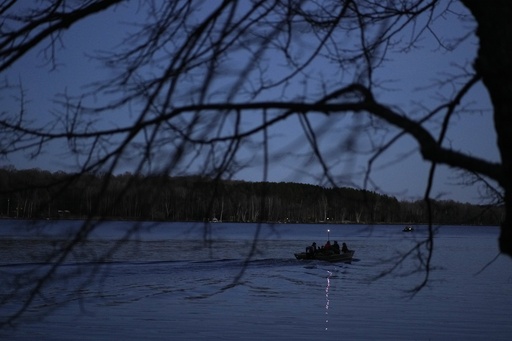In Hayward, Wisconsin, 15-year-old spearfisher Gabe Bisonette fearlessly ventures out onto chilly nights on Chippewa Flowage to practice Ojibwe spearfishing. With his father at his side, he expertly lands walleye after spotting their eye-shine in the dark waters. Bisonette reflects on the importance of preserving this traditional way of life, especially as warming waters and development threaten walleye populations. Despite challenges, efforts are being made to sustain this practice for future generations through science and management strategies.
Indigenous people like the Ojibwe have long fought to protect their treaty rights, which allow for hunting, fishing, and gathering wild rice in specific areas. However, these rights have been historically challenged, leading to conflicts and opposition. Despite legal victories affirming their rights, tensions at times persist, requiring security measures for tribal members engaging in traditional activities.
To safeguard walleye populations, spearfishers must follow regulations limiting catches, with some lakes being restocked artificially. Collaboration between tribes, local conservation teams, and government agencies aims to monitor and address shifts in fish populations. Concerns about dwindling walleye reproduction rates and habitat alterations due to climate change and development are prompting updated conservation plans and vulnerability assessments.
As climate change impacts inland lakes, tribal members are at the forefront of witnessing these changes. Their deep connection to the land and water drives efforts to adapt and protect their cultural traditions. By combining Indigenous knowledge with scientific research, communities strive to ensure the sustainability of resources for future generations.
Tribal members like Kelly Martin embrace their role as stewards of the land, spearfishing to provide food for elders and preserve cultural practices. Martin acknowledges the challenges posed by environmental shifts and development, emphasizing the importance of maintaining traditions for the well-being of his community. Through conservation efforts and traditional practices, tribal members remain committed to safeguarding their heritage and natural resources.
Efforts to balance cultural preservation with environmental conservation highlight the resilience and adaptability of Indigenous communities in the face of climate change. With ongoing collaboration between tribes, researchers, and policymakers, there is hope for sustaining traditional practices and protecting vital ecosystems for generations to come.


